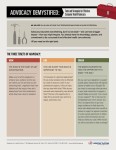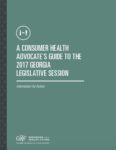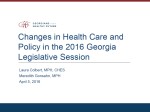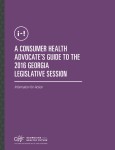- Home
- >
- Get Involved
- >
- Learn
- >
- Tools & Strategies for...
Tools & Strategies for Effective Advocacy
Ad-vo-cate (n. ad-vuh-kit): one that defends or maintains a cause or proposal
Advocacy may seem overwhelming, but it’s a lot easier—and can have a bigger impact—than you might imagine. You already have the knowledge, passion, and commitment to be a successful and effective health care advocate.
All you need are the right tools.
Three Tenets of Advocacy:

The hook is the start of any conversation.
Make sure to tell the legislator (or whoever your audience is) who you are, where you live and why you are contacting them. Legislators hear from lobbyists all day long but they don’t always hear from their constituents, whom they have a duty to represent.

The line is why this issue is important to you.
Is it because of a personal experience? Do you know someone who is affected by a lack of access to care? In your professional capacity, is this an issue that you deal with often? Why do you care and more importantly, why should they? The line is the opportunity to make this a personal issue and not a vague, anonymous one.

The sinker is where you take the opportunity to make “the ask.”
Do you want your legislators to support a public policy measure that will improve access to health care in Georgia? Do you want to encourage other partners in your local community to support a cause? Make sure to ask, “Can I count on your support?” He or she may not immediately have a firm answer, but this is an opportunity to spur your target audience to think about the issue more deeply and come up with a reason to support or oppose a solution. It is also a great opportunity to follow up with useful information that can help you make your case. What would you like to see done to make a change?
You Know Why You’re Speaking Out...Now Here’s How

MAKE A CALL, SEND A LETTER, SEND AN EMAIL
Whenever you reach out to a legislator or key decision-maker, make sure to include your name, address, why you care about the issue and ask for a concrete deliverable.

SOCIAL MEDIA
The power of social networking is that it is a simple way to share your opinions and proposed solutions to basic health care problems with friends and family and in turn get them thinking about the issues most important to them.
Like it, Tweet it, Share it!

TELEVISION / RADIO / NEWSPAPER RELATIONSHIPS
See an article about health care that you agree with or disagree with? Writing a letter-to-the-editor to share your opinion and proposed solutions is a great way to maximize exposure for some of the most pressing health care issues across the state. Take opportunities to meet with your local Editorial Board to inform them of key health care issues facing your community.

COMMUNITY-LEVEL ORGANIZATIONS
Are you a part of the local PTA? Do you attend Neighborhood Planning meetings or City Council Hearings? Do you volunteer with your church or other religious institutions? Bringing the challenges and opportunities of the future of our health and health care to these groups and partners brings the people who have the most to gain from a local perspective into the problem solving process, helping ensure its success.
Empowering you to make a difference
Share Your Story
Your story is powerful! Stories help to put a human face to health care issues in Georgia. When you share your story, you help others understand the issue, and its impact on Georgians. Watch the video and learn how you can share your health care story with us and with others in your community.
Meet Your Legislator
Your elected officials hear from lobbyists regularly but they don't hear as often from concerned citizens who have a personal story to share. Meeting and communicating with your state legislators gives you the ability to influence their opinions and votes on the issues that you are most concerned about.
Social Media
The power of social networking can be a simple way to reach a broad audience. In this video, you'll hear from GHF's Communications & Special Projects Manager about how social media can be a powerful tool for advocacy and how to effectively use it to address the issues most important to you.
WHAT CAN YOU DO TO HELP?
Additional Tools & Resources for Advocacy (8 items) Go to Library







